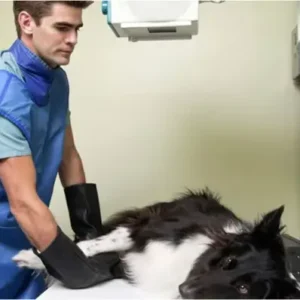Types of Allergies in Dogs
Dogs can develop allergies to food, the environment, fleas, or contact with irritants. Each type has unique symptoms and requires different treatments. Recognizing these allergies helps in early diagnosis and proper care.
Food Allergies
Food allergies occur when a dog’s immune system overreacts to certain ingredients in its diet. Common food allergens include:
- Chicken
- Beef
- Dairy
- Wheat
- Egg
- Soy
Symptoms of Food Allergies
Dogs with food allergies may exhibit a range of symptoms, including:
- Chronic ear infections
- Persistent itching
- Gastrointestinal disturbances
- Vomiting
- Diarrhea
- Redness
- Hair loss
Diagnosis and Treatment
Diagnosing food allergies typically involves an elimination diet, where suspected allergens are removed from the dog’s diet for several weeks. If symptoms improve, individual ingredients are gradually given a food trial to identify the specific allergen. Treatment often involves switching to a hypoallergenic or limited-ingredient diet to prevent further allergic reactions.
Environmental Allergies (Atopic Dermatitis)
Environmental allergies, also known as atopic dermatitis in dogs, occur when a dog breed is exposed to airborne or environmental allergens, such as:
- Pollen
- Mold
- Dust mites
- Grass
- Smoke
Symptoms of Environmental Allergies
Dogs with environmental allergies may develop:
- Excessive scratching
- Red and inflamed skin
- Recurrent ear infections
- Watery eyes
- Sneezing
Unlike food allergies, these symptoms often follow a seasonal pattern depending on the presence of allergens in the environment.
Diagnosis and Treatment
Veterinarians diagnose environmental allergies through blood or skin tests to identify specific triggers. Treatment options may include antihistamines, medicated shampoos, corticosteroids, or allergen-specific immunotherapy (allergy shots) to manage symptoms effectively.
Flea Allergy Dermatitis (FAD)
Flea allergy dermatitis is one of the most common allergic reactions in dogs, caused by an overreaction to flea saliva following a bite. Some dogs experience extreme discomfort even from a single flea bite.
Symptoms of Flea Allergy Dermatitis
- Intense itching, particularly around the base of the tail
- Red, itchy skin
- Hair loss
- Development of scabs or sores due to excessive scratching
Diagnosis and Treatment
Veterinarians diagnose flea allergy dermatitis based on clinical signs and the presence of fleas or flea dirt. Treatment includes consistent flea prevention using oral or topical flea control medications. Dogs experiencing severe reactions may require anti-inflammatory medications to relieve itching and discomfort.
Contact Allergies
Contact allergies occur when a dog’s skin reacts to direct exposure to an irritant.
Common allergens include:
- Certain shampoos
- Cleaning products
- Synthetic fabrics
- Grass or specific plants
Symptoms of Contact Allergies
- Localized skin irritation
- Redness and rashes
- Persistent itching in affected areas
Treatment
The most effective treatment for contact allergies is to identify and eliminate the allergen from the dog’s environment. In cases where avoidance is not possible, veterinarians may recommend hypoallergenic shampoos, medicated creams, or oral medications to alleviate symptoms.
Common Symptoms of Allergies in Dogs
Regardless of the type of allergy, common symptoms include:
- Excessive scratching and licking
- Red, inflamed skin
- Recurring ear infections
- Gastrointestinal distress, including vomiting and diarrhea
- Sneezing, coughing, or watery eyes
Persistent or severe symptoms warrant veterinary evaluation to determine the underlying cause and appropriate treatment.
Diagnosing Allergies in Dogs
Veterinarians use various diagnostic methods to confirm allergies in dogs:
- Elimination Diet: Removing potential allergens from a dog’s diet to assess symptom improvement.
- Skin Allergy Testing: Introducing small amounts of allergens to absorb through the skin to observe reactions.
- Blood Tests: Measuring immune system responses to suspected allergens.
Accurate diagnosis is crucial for effective allergy management and long-term relief.
Treatment and Management of Allergies in Dogs
If a dog is allergic to certain foods, environmental factors, fleas, or contact irritants, proper management is crucial for their well-being. Treatment options vary depending on the allergy type and severity, ranging from dietary changes to medications and natural remedies.
Dietary Modifications
For food allergies in dogs, transitioning to a grain-free, hypoallergenic, or raw diet can help reduce allergic reactions.
Medications
Veterinarians may prescribe antihistamines, corticosteroids, or immunotherapy injections to manage symptoms. In severe cases, immune-modulating drugs may be necessary for long-term control.
Flea Prevention
For dogs with flea allergies, regular flea prevention is essential. This includes the use of oral or topical flea treatments to prevent infestations.
Environmental Control
Reducing exposure to allergens can help alleviate symptoms. Strategies include:
- Using air purifiers to remove airborne allergens.
- Cleaning bedding and household surfaces regularly.
- Bathing dogs with medicated or hypoallergenic shampoos to remove allergens from their skin and coat.
Natural Remedies
Some pet owners explore natural remedies to manage mild allergy symptoms, including:
- Omega-3 fatty acids to support skin health and reduce inflammation.
- Coconut oil is a natural moisturizer for dry, irritated skin.
- Oatmeal baths to soothe itching and discomfort.
Preventing Allergies in Dogs
To minimize allergic reactions, dog owners should:
- Maintain a clean, allergen-free home environment.
- Ensure consistent flea prevention measures.
- Provide a high-quality, well-balanced diet to support immune health.
- Regularly bathe and groom their dogs to remove allergens from the coat and skin.
Health Conditions Linked to Allergies in Dogs
Several health conditions can be connected to allergies in dogs, either as complications arising from persistent symptoms or due to a weakened immune system.
These include:
- Atopic Dermatitis: Chronic skin inflammation is often linked to environmental allergies.
- Ear Infections: Recurring ear infections are common in allergic dogs, especially those with food or environmental allergies.
- Yeast Infections (Malassezia Dermatitis): Allergies can weaken the skin barrier, leading to secondary yeast overgrowth and persistent itching.
- Bacterial Skin Infections (Pyoderma): Constant scratching from allergies can break the skin, leading to bacterial infections.
- Asthma or Respiratory Issues: Some dogs with severe environmental allergies may develop respiratory symptoms similar to asthma.
- Gastrointestinal Disorders (IBD): Food allergies can contribute to chronic vomiting, diarrhea, or inflammatory bowel disease (IBD) in some dogs.
- Autoimmune Skin Disorders: Chronic allergies may trigger or worsen immune-mediated conditions affecting the skin.
- Hypothyroidism: Some allergic dogs may also develop hypothyroidism, which can further impact skin and coat health.
When to Seek Veterinary Care
If a dog exhibits severe itching, swelling, difficulty breathing, or persistent infections, veterinary care is essential. Chronic allergies can lead to secondary bacterial or yeast infections, requiring specialized treatment.
Allergies in dogs can significantly impact their health and comfort. By understanding the types, symptoms, and treatment options, pet owners can take proactive steps to manage allergies effectively. Early diagnosis, environmental control, and appropriate treatment plans are essential for ensuring a dog’s long-term well-being. If symptoms persist or worsen, consulting a veterinarian is the best course of action for proper diagnosis and treatment.








